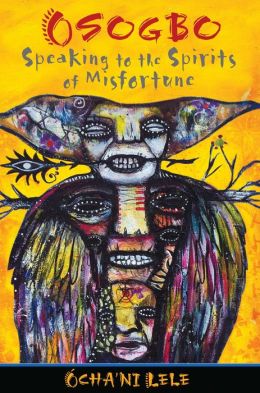When people read a book by Ocha'ni Lele, they are in the presence of a master. His wisdom and collected knowledge are vast. Osogbo is the newest of a series of books by this marvelous author. Lele is making a great effort to record the oral traditions of Lucumi. His books preserve this knowledge for members of the Lucumi (Santeria) faith, and also makes this often misunderstood religion accessible to people outside of it.
Osogbo delves into the painful topic of misfortunes in the world. The author was motivated and inspired by his own experiences, and relates his own difficulties at various points. Being a wise isn't a free pass from misfortunes, and its easier to be wise for others than when dealing with one's own experiences. The book is a journey where the master and student learn together. This gives the book a prevalent tone of empathy, compassion, and down-to-earth candor.
Lele discusses aspects of Lucumi cosmology. He points out the difference between a dualistic (Judeo-Christian) view of the world as good and evil versus seeing sorrows and misfortunes as symptoms of imbalance. There's an enormous difference! Evils aren't inherent, they're created and operate primarily through humans. Nature is self-correcting, but people aren't. Our lives are messy. When one osogbo, or misfortune, gains a hold of a person, the others come to join the feeding frenzy. The book gives fascinating insights into the cosmic functioning behind people's real-life struggles and sorrow.
'Osogbo' means “misfortune,” but its also the name of a spiritual entity. And that spiritual entity has several children, sixteen specific osogbos that represent different kinds of misfortunes. And those children have children and grandchildren, too. The reader is given an introduction to the sixteen osogbos. There's a discussion on the inner-workings of destiny that gives the context for the misfortunes that might come into a person's life.
The osogbo are explained through patikis, traditional Lucumi stories used as narratives to inform the Diloggun oracle. These are helpful in illustrating why misfortunes are necessary in life; without them, we would not learn, strive, or grow. The patikis are mostly stories about the gods, orishas, or osogbos talking or fighting amongst themselves. They explain why certain misfortunes work together, and why certain human qualities tend to attract misfortunes like a magnet. There's a long chapter on the osogbo Iku, the spirit of death, followed by a chapter about Araye, the spirit of wickedness and chaos. The final chapter offers patikis about the other osogbo. There is an Afterword, end notes, a glossary of Lucumi terms with a short guide to pronunciation, a bibliography and an index.
This is a great book with many fine life lessons. Understanding the nature of misfortunes is the first step to restoring balance. A reader doesn't have to be mired in troubles to benefit from this book, but it's a wonderful resource for those who are struggling with any kind of life problem. The writing style is friendly and conversational. Unfamiliar terms are carefully explained. As is the case with Lele's previous books, the story-telling is top-notch. It's a refreshing departure from Western sentiments and worldviews, and invaluable for those who would like to get a fresh, holistic viewpoint on the problems in the world and perhaps on personal struggles as well.
An author has to be a ninja wizard to make this terrible topic attractive and digestible, but Lele manages it with consummate skill. The team at Destiny Books gets high marks for careful editing, clean formatting, for participating in the Sustainable Forestry Initiative, and for continuing to publish these incredibly important books. Very highly recommended!
~review by Elizabeth Hazel
Author: Ocha'ni Lele
Destiny Books/Inner Traditions, 2014
218 pgs, $16.95 pb
Osogbo: Speaking to the Spirits of Misfortune

©
2010 - 2025
Facing North
